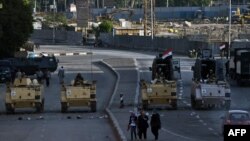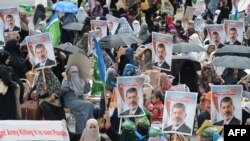CAIRO —
Egypt's military chief, General Abdel-Fatah el-Sissi, on Sunday threatened renewed force against attacks on government buildings and police stations by anti-government protesters. But Sissi told military and police officers the army has no intention of seizing power.
He called on Islamic supporters of ousted President Mohamed Morsi to join the political process, saying "there is room for everyone."
Opponents of the military backed interim government planned, and then canceled, two large protests on Sunday - citing fears of more attacks by security forces. But some protesters marched in spite of the concerns.
It was Cairo's quietest day since Wednesday, when security forces began their crackdown against supporters of the ousted president, who had been occupying two public squares. More than 800 people have been killed in the crackdown, including some members of the security forces.
Protest leaders canceled two marches scheduled for Sunday, claiming snipers had been deployed along the planned routes.
Meanwhile, the interim government installed by the military after the July 3rd ousting of President Morsi met, in part, to discuss a proposal to force the country's largest Islamist group, the Muslim Brotherhood, to disband. Mr. Morsi was a senior Brotherhood official before resigning to run for president, and it still forms the core of his supporters.
The use of force by security units in recent days has further strained the interim government's foreign relations. Many countries had grudgingly accepted the ousting of the elected president, but are now appalled by the violent crackdown.
On Sunday, Egyptian Foreign Minister Nabil Fahmy downplayed some tough talk on the subject by U.S. President Barack Obama.
“He did condemn what he considered to be excessive use of force by government forces. He also condemned violence throughout the events by all parties. And he also emphasized the importance of the Egyptian-American relationship and his interest in pursuing that. We will take the speech as a whole and we analyze it in detail," he said.
Foreign Reactions
The situation in Egypt puts many foreign governments in a quandary. But at Human Rights Watch, researcher Heba Morayef says there is one thing world leaders should definitely do.
“This is a moment where the international community needs to use whatever leverage it has in its relations with the Egyptian authorities, and in particular with the Egyptian military, because this is an incredibly volatile situation, because we are likely to see more violence. Whenever the police uses excessive force in response they exacerbate the situation," she said.
Many governments have done just that, and Saturday night's mosque-clearing operation was done mainly by tear gas, without the widespread use of gunfire that resulted in mass casualties during the previous days.
While the activists consider how to resume their protests, families continue to line up at Cairo's morgue, waiting to claim the bodies of their loved ones.
He called on Islamic supporters of ousted President Mohamed Morsi to join the political process, saying "there is room for everyone."
Opponents of the military backed interim government planned, and then canceled, two large protests on Sunday - citing fears of more attacks by security forces. But some protesters marched in spite of the concerns.
It was Cairo's quietest day since Wednesday, when security forces began their crackdown against supporters of the ousted president, who had been occupying two public squares. More than 800 people have been killed in the crackdown, including some members of the security forces.
Protest leaders canceled two marches scheduled for Sunday, claiming snipers had been deployed along the planned routes.
Meanwhile, the interim government installed by the military after the July 3rd ousting of President Morsi met, in part, to discuss a proposal to force the country's largest Islamist group, the Muslim Brotherhood, to disband. Mr. Morsi was a senior Brotherhood official before resigning to run for president, and it still forms the core of his supporters.
The use of force by security units in recent days has further strained the interim government's foreign relations. Many countries had grudgingly accepted the ousting of the elected president, but are now appalled by the violent crackdown.
On Sunday, Egyptian Foreign Minister Nabil Fahmy downplayed some tough talk on the subject by U.S. President Barack Obama.
“He did condemn what he considered to be excessive use of force by government forces. He also condemned violence throughout the events by all parties. And he also emphasized the importance of the Egyptian-American relationship and his interest in pursuing that. We will take the speech as a whole and we analyze it in detail," he said.
Foreign Reactions
The situation in Egypt puts many foreign governments in a quandary. But at Human Rights Watch, researcher Heba Morayef says there is one thing world leaders should definitely do.
“This is a moment where the international community needs to use whatever leverage it has in its relations with the Egyptian authorities, and in particular with the Egyptian military, because this is an incredibly volatile situation, because we are likely to see more violence. Whenever the police uses excessive force in response they exacerbate the situation," she said.
Many governments have done just that, and Saturday night's mosque-clearing operation was done mainly by tear gas, without the widespread use of gunfire that resulted in mass casualties during the previous days.
While the activists consider how to resume their protests, families continue to line up at Cairo's morgue, waiting to claim the bodies of their loved ones.












